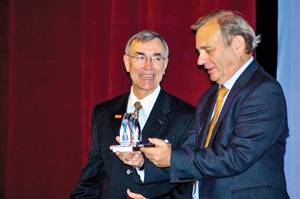Going ‘Doubly Green’

Gregory Geoffroy, president of Iowa State University, hands an award off to Sir Gordon Conway, chief scientific adviser for the Department for International Development, UK, after he gave a lecture on the Global Agricultural Crisis of the 21st Century, during the 2008 Norman E. Borlaug Lecture, Monday, October 3rd, 2008, in the Great Hall of the Memorial Union. Conway proposed a “Doubly Green Revolution” to counter many agricultural problems present in developing countries today. Photo: Logan Gaedke/Iowa State Daily
October 13, 2008
While rising food prices are an annoyance in high-income countries, the number of hungry in the world has increased by more than 150 million since the price hike began, said an agricultural ecologist at the Norman Borlaug Lecture on Monday.
Sir Gordon Conway, chief scientific adviser for the Department for International Development in the United Kingdom, discussed solutions to the current food crisis before a crowd of agriculture students and faculty in the Durham Great Hall of the Memorial Union.
“We’re living in a time of crisis. And not just one crisis, but a time of at least seven crises,” Conway said.
In his lecture, titled “The Challenges of the Global Agricultural Crisis of the 21st Century,” Conway said steps need to be taken now to ensure that everyone in the world is fed properly.
He said a variety of factors caused the current food crisis, including a rising global population, increasing water and land scarcity and the impact of climate change.
To stop the rising price of food, Conway said a new agricultural revolution needs to take place, embracing traditional and modern farming practices to ensure sustainable and cost-effective crops. He said the Green Revolution that started in the 1940s was the most successful agricultural initiative to date.
“It was a great success story, but it had its limitations,” Conway said. “We need to recreate it in a way that’s more environmentally friendly, more sustainable and more equitable.”
Global climate change poses the biggest threat to agriculture today, Conway said, as some are predicting a five-degree temperature rise in some parts of the world. He said no one can be sure of how certain areas will be affected by higher temperatures and water levels in the coming decades.
“The biggest problem I think we’re going to face is doubt. For the most part we don’t know what’s going to happen. We don’t know whether the Nile is going to run dry or not,” Conway said.
Conway said he believes today’s college students will live to see the day when every village in the world has its own generator running on plant-based fuel and the genomes of all the world’s crops will be preserved in a vault for future generations.
ISU President Gregory Geoffroy introduced the lecture and commended Conway’s work on the food crisis.
“Many scientists and institutions, including Iowa State, are following the path he blazed in creating sustainable agricultural and sustainable rural livelihoods,” Geoffroy said.
Students who attended the lecture said it was an eye-opening experience to hear about the food deficiencies in developing countries.
Dillon Drury, freshman in agriculture and life science exploration, attended the lecture and said he learned that the world’s agricultural situation was worse than he had first suspected.
“I was surprised at the emphasis on Africa and how they had so many problems with sustainable food over there. I thought they had solved that,” Drury said.
















